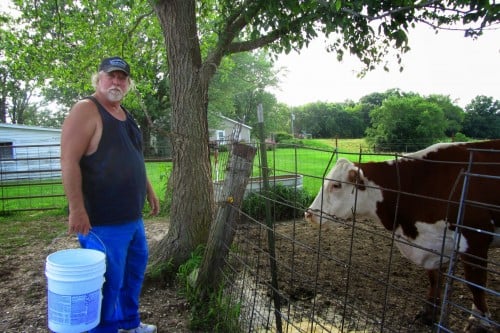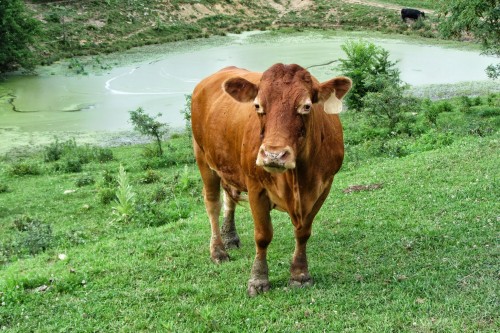
This is the 3rd and final profile in a 3-part series. Story and photos by Siena Chrisman.
Roger Allison raises beef calves with his wife, Rhonda Perry, on rolling pastures in the hills of central Missouri. Their cattle graze on lush grass and cool themselves in a valley pond in the heat of the summer. Industrially-focused farm professionals suggest that beef cows should be sold at age ten because they stop producing calves; on Roger and Rhonda’s pastures, cows still calve at twice that age. “And once a cow’s lived that long and taken care of us,” says Roger, “well, then we’re just running a nursing home.” At age 26, cows #3 and #100 are living out their days on the farm with nothing to do but graze and sleep. “They say it’s bad management, but that’s how we do it. They talk about how you’ve got to treat your livestock just like a piece of machinery… but why be a farmer if you’re going to do that?”
Roger and Rhonda have spent their lives fighting for the survival of family farms like theirs in the face of “expert” advice and a policy framework that has come to favor and incentivize large corporate farm operations. Roger is the Executive Director and founder of the Missouri Rural Crisis Center (MRCC) and Rhonda is Program Director; along with helping to manage the organization, Roger tends to the cattle on the farm. He was a major force in the last powerful progressive farmer-led movement in the 1970s and 1980s, and his many stories range from working with Jesse Jackson to the corporatization of the local electric coop to the proliferation of herbicide-resistant superweeds. The connecting threads are his deep care for people, animals, community and land, and his willingness to fight for them.
 Roger first began Missouri Rural Crisis Center as part of the North American Farm Alliance, in 1985, though he was an organizer long before. “We had raised hell in Missouri since the 1970s,” he says. “We put thousands and thousands in the streets and in front of courthouses,” calling for a fair price for farmers—”parity, not charity,” as the protest sign had it: a guaranteed price based on the cost of production rather than hand-outs. Other protests were for civil rights and against South African apartheid. Shortly after its founding, MRCC was instrumental in a protest that occupied the parking lot of the Chillicothe, Missouri, USDA office for 145 days. In the short term, the protest aimed to force out a county supervisor who was unlawfully foreclosing on farms; on a larger scale, it aimed to pressure Missouri lawmakers to pass the farm credit act that would address the rapid rate of farm foreclosures in rural America. In the end, the supervisor was disciplined and transferred, and President Ronald Reagan signed the Agricultural Credit Act into law in 1987—a bill Roger calls “the most progressive piece of legislation since the New Deal.”
Roger first began Missouri Rural Crisis Center as part of the North American Farm Alliance, in 1985, though he was an organizer long before. “We had raised hell in Missouri since the 1970s,” he says. “We put thousands and thousands in the streets and in front of courthouses,” calling for a fair price for farmers—”parity, not charity,” as the protest sign had it: a guaranteed price based on the cost of production rather than hand-outs. Other protests were for civil rights and against South African apartheid. Shortly after its founding, MRCC was instrumental in a protest that occupied the parking lot of the Chillicothe, Missouri, USDA office for 145 days. In the short term, the protest aimed to force out a county supervisor who was unlawfully foreclosing on farms; on a larger scale, it aimed to pressure Missouri lawmakers to pass the farm credit act that would address the rapid rate of farm foreclosures in rural America. In the end, the supervisor was disciplined and transferred, and President Ronald Reagan signed the Agricultural Credit Act into law in 1987—a bill Roger calls “the most progressive piece of legislation since the New Deal.”
Despite Reagan’s signing of the Credit Act, Roger’s political allegiances were elsewhere: he worked with Jesse Jackson on his campaigns in 1984 and 1988, because Jackson was the only presidential candidate to address farm issues, as he built his diverse “Rainbow Coalition.” In an unexpected alliance, rural, mostly-white Missouri counties caucused for Jackson in both his campaigns, along with Black urban counties, university students, and others—because he addressed the farm crisis as a social justice issue. Farmers were a critical voting bloc, but had been ignored for years. “When there’s someone willing to stand up and fight,” Roger says, “there are votes there.”
Continue reading on WhyHunger’s Digital StoryTelling Website.
About the Author Siena Chrisman has worked on sustainable food and farm issues for more than a decade. Her writing has appeared in Civil Eats, Modern Farmer and Grist, among other outlets. Formerly an organizer and writer with WhyHunger, where she was director of the online Food Security Learning Center and manager of the Connect Blog, her current freelance research and writing focuses on commodity farmers, livestock and farm policy. Siena was raised on raw milk in rural Massachusetts, and now lives in Brooklyn.


